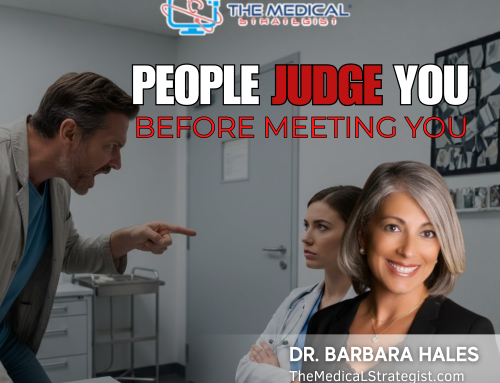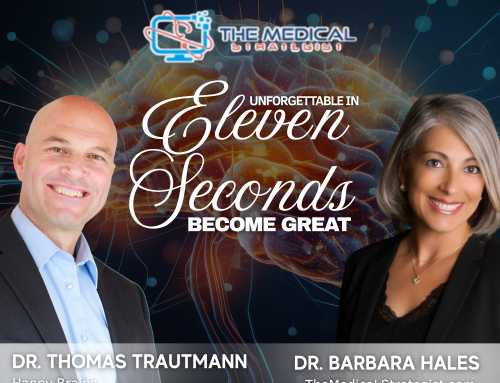Podcast: Play in new window | Download
Subscribe: RSS
Are you tired of spending money on marketing that never seems to turn into patients? Many doctors and practice owners waste thousands of dollars chasing vanity metrics—like impressions, clicks, and reach—only to end up frustrated, broke, and no closer to filling their schedules. What if you could finally run ads that actually convert into appointments?
In this episode of Marketing Tips for Doctors, host Dr. Barbara Hales sits down with John Sanders, founder of RevKey, who has helped hundreds of medical professionals—from therapists to dentists—transform their marketing by focusing on conversions that count. Blunt, transparent, and refreshingly honest, John has spent over 7 years building systems that help doctors stop wasting money and start growing sustainable practices with Google Ads.
If you’ve ever wondered why your ads aren’t working, how much you should really budget, or how to avoid Google’s costly “suggestions,” this episode will change how you look at digital advertising for your practice.
He highlights several common areas that often undermine marketing success for medical practices:
- Lack of Patience with Campaigns: Many doctors expect instant results from Google Ads, but real data and optimization require 3–6 months before clear ROI can be measured.
- Unprepared Websites and Intake Systems: Sending traffic to poorly designed service pages or weak onboarding processes leads to wasted ad spend, even if the ads themselves are effective.
- Blindly Following Google’s Suggestions: Google prioritizes its revenue over your success. Accepting automated recommendations—especially in regulated medical fields—can create compliance risks and irrelevant traffic.
- Unrealistic Budgeting: Doctors often underestimate the monthly investment required. In competitive cities, $1,500+ per month is the baseline, and failing to budget properly means campaigns fizzle before gaining traction.
Key Takeaway:
“Even the best ads can’t fix a broken intake system. If calls aren’t answered, your marketing dollars are wasted.” – John Sanders
Connect with John Sanders:
Website: https://www.revkey.com/
Connect with Barbara Hales:
Twitter: @DrBarbaraHales
Facebook: facebook.com/theMedicalStrategist
Business website: www.TheMedicalStrategist.com
Email: info@TheMedicalStrategist.com
YouTube: TheMedicalStrategist
LinkedIn: www.linkedin.com/in/barbarahales
Books:
Content Copy Made Easy
14 Tactics to Triple Sales
Power to the Patient: The Medical Strategist
TRANSCRIPTION (212)
Welcome and Introduction
Dr. Barbara Hales (00:02): Welcome to another episode of Marketing Tips for Doctors. I’m your host, Dr. Barbara Hales, and today we have with us John Sanders. If you’re tired of agencies that talk metrics but don’t deliver patients, John can change that. As the founder of RevKey, he has helped hundreds of practice owners move beyond vanity metrics and focus on what matters most—conversions that count. Specializing in healthcare marketing, particularly for therapists, dentists, and chiropractors, John brings blunt transparency and proven systems to turn ad spend into real appointments.
John Sanders (00:22): Thanks for having me, Barbara.
Getting Started in Google Ads
Dr. Barbara Hales (01:18): How did you get started in this?
John Sanders: With a background in marketing, John first worked in dental-focused advertising before launching RevKey. Over the past seven years, he’s built a reputation for helping medical professionals grow sustainable practices with Google Ads, particularly in mental health.
Why Google Ads for Doctors?
Dr. Barbara Hales (02:54): Why Google Ads over other ad types?
John Sanders: Google Ads meet patients where they’re searching—on Google, YouTube, and Gmail—making them ideal for new practices without strong SEO. Unlike social media ads, which interrupt people during leisure time, Google captures patients with intent, ready to book.
Common Mistakes in Google Ads
Dr. Barbara Hales (03:47): What are common mistakes people make?
John Sanders: He highlights three:
- Impatience—expecting instant results before enough data is collected.
- Unprepared websites and intake systems often result in traffic being sent to generic service pages or hindered onboarding.
- Blindly following Google’s suggestions—which may lead to compliance issues, wasted spend, or inaccurate claims in ads.
Budgeting for Results
Dr. Barbara Hales (07:30): What should doctors expect to spend?
John Sanders: Costs vary by market. Clicks typically range from $3 to $15, meaning budgets in competitive areas like New York start around $1,500/month. Smaller markets may spend less, but practices must plan realistically for sustained campaigns.
Measuring Conversions
Dr. Barbara Hales (09:17): How do you measure results?
John Sanders: Success isn’t traffic—it’s leads. His baseline metric: 5% of ad clicks should become conversions, whether that’s form fills, calls, or scheduled appointments. Tracking these actions ensures ad dollars translate into patients.
Importance of Onboarding
Dr. Barbara Hales (10:34): How important is onboarding?
John Sanders: Extremely. Even strong campaigns can collapse if staff fail to answer calls or follow up with leads. He sometimes audits client intake spreadsheets to pinpoint where potential patients drop off.
AI in Patient Communication
Dr. Barbara Hales (12:59): Can AI help with intake gaps?
John Sanders: Yes. AI bots are increasingly capable of handling simple tasks like scheduling dental cleanings, though complex medical conversations still require human empathy.
Rules for Medical Ads
Dr. Barbara Hales (13:36): What special rules apply to healthcare ads?
John Sanders: HIPAA compliance limits remarketing and restricts certain personalized ads. While Google was once stricter, it has relaxed some guidelines in recent years. Still, practices must tread carefully.
Tips for New Practices
Dr. Barbara Hales (15:00): What if a doctor is new in town?
John Sanders: Launch Google Ads immediately to generate patients while SEO builds over time. At the same time, prioritize community networking and referrals, especially for services that patients rarely self-search (like immigration or bariatric psychological evaluations).
Google Ads vs. Facebook Ads
Dr. Barbara Hales (18:25): Are Google Ads more effective than Facebook Ads?
John Sanders: Yes. Google captures intent—patients searching “therapy near me” are ready to book. Facebook can help with brand awareness, but often fails to generate meaningful conversions for small practices.
Closing Remarks
Dr. Barbara Hales (19:34): Thank you for joining us today.
John Sanders: Practices should remember: Google Ads drive 75% of Google’s revenue, and with 35 searches on Google for every one done in AI, search engines aren’t going away. Doctors who master ads today will thrive in the years ahead.



